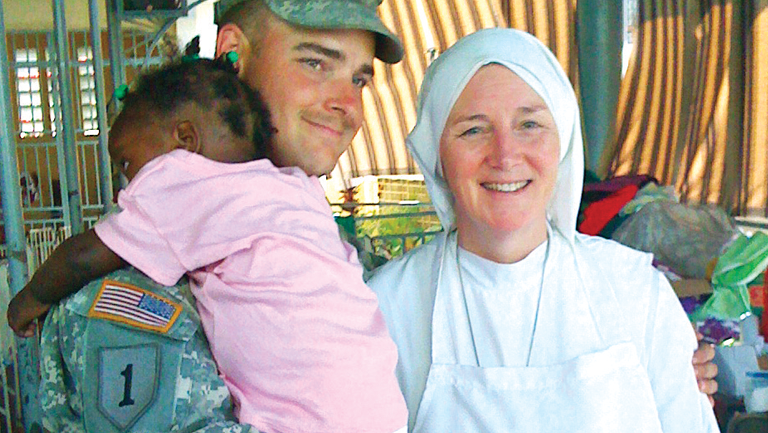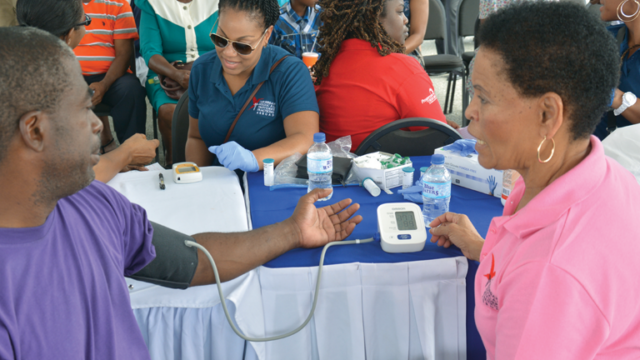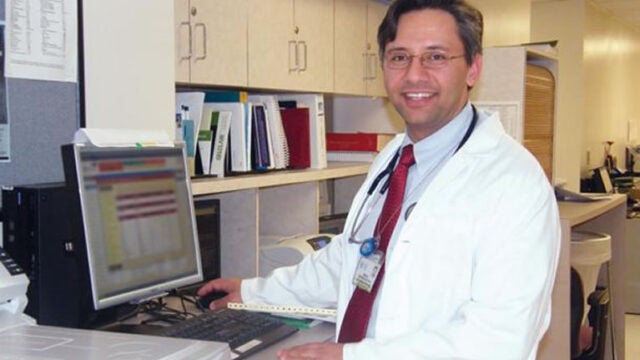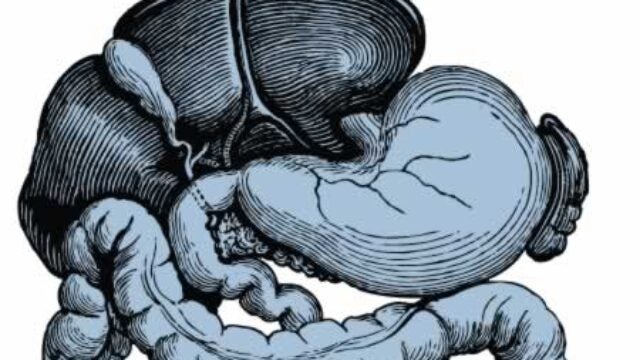
Title:Sister Dede Answers the Call
In Fatigues, Scrubs, or Habit
Above: Byrne served in Haiti in 2010 after the devastating earthquake.
The life and career of surgeon Sister Deirdre Byrne, MD (M’82, R’97), has included the political tensions of war and conflict, as well as deep inner peace. She has performed surgery under challenging conditions in Afghanistan, and provided care to returning soldiers as she rose to become colonel in the U.S. Army Medical Corps and as a reservist. She has served as a missionary surgeon responding to natural and man-made crises in Kenya, Sudan, Haiti, and Iraq. And on September 11, 2001, she made her way on foot to Ground Zero to bring supplies and support to firefighters in the smoke-filled air during the first two days of the tragedy.
Throughout these experiences and more, Byrne was on a personal journey to discern her calling and to profess her vows as a woman religious. She is now a sister of the Little Workers of the Sacred Hearts in Washington, D.C., where she serves as medical director of their pro bono Physical Therapy and Eye Clinic at their convent, as well as volunteer surgeon at the Catholic Charities Medical Clinic (formerly of the Spanish Catholic Center). Whether in military fatigues, in scrubs, or in her habit, she says she’s there to work hard for her patients.
Serving the Country Through Army Medicine
A life of medicine, service to the poor, religious vocation, and a Georgetown education now seem that they were all but inevitable for Byrne.
She grew up in the Washington suburb of McLean, Virginia, in a large, devout, go-todaily- Mass, Roman Catholic family. Byrne quotes her mother that her call to serve others as a religious sister “started in utero,” simultaneously laughing and serious as she shares the story. Mother Teresa was her high school hero.
If the life of a religious was a calling, so too was the life of a physician. By “a miraculous event,” as she calls it, Byrne was accepted to Georgetown School of Medicine. Georgetown was a family tradition: her father, thoracic surgeon William Byrne, was medical class of 1948 and completed a residency at Georgetown in 1956, in addition to her brothers Kevin (M’79) and John (M’87).
With seven siblings, Byrne knew that money was tight. The military offered a scholarship program, so Byrne joined the Army in 1978 as a medical student, and received a military medical scholarship. Her military service of family medicine and surgery would last nearly 30 years.
After a three-year family medicine residency at the U.S. Army hospital at Fort Belvoir, Virginia, Byrne began the scholarship “payback” period. As a full-time military officer, she served 13 months in the Sinai Peninsula, Egypt as liaison between the Army and the monks of St. Catherine’s Monastery. One of the oldest surviving Christian monasteries, it is located at the base of Mt. Sinai, an area sacred to all three Abrahamic faiths.
After the Sinai, Byrne volunteered to serve in Korea to practice family medicine and emergency medicine. Running the ER gave her the opportunity to scrub in to assist surgeons. “I was thirsty for hands-on experience and was already toying with the idea of doing general surgery,” she says.
“The military was pretty hard core, but I don’t regret a minute of it,” says Byrne.
Her time in the service was more than just a payback for her. “I always wanted to be there to help our country,” she says. “The Army—this country—gave me a free medical education, and I am grateful.”
A Grueling—and Humbling—Surgical Residency
After completing a seven-year commitment of full-time medical service in the Army Medical Corps, in 1989 Byrne spent a year doing missionary medicine. During part of that year she worked in India with a surgeon named Sister Frederick, who had done her surgical training at Georgetown. The friendship and mentorship strengthened Byrne’s dual vocations, but the call to be a religious was put on hold for the call to be a surgeon.
Byrne was accepted into an Army general surgical residency program and deferred this to do surgical training beginning in 1990 and ending at Georgetown in 1994.
“I was thrilled to get into the program,” she says. Work weeks of 100 or more hours are grueling for any surgical resident, but Byrne also remembers the excitement. “The Army had boosted my confidence, and I really flourished in those days.”
For someone with less pluck and inner strength, entering a residency program eight years after graduating would have made for more than a few uncomfortable situations. Her brother John, five years her junior, was already an orthopaedic resident at Georgetown; medical classmates were already attending physicians. “It was a bit humbling,” she admits.
“But humility is good for people,” she says with a smile.
Residency and fate also brought her two callings together. In 1996, as chief surgical resident, Byrne was the first assistant when Cardinal James Hickey, Archbishop of Washington from 1980 to 2000, had open-heart surgery, and she also cared for him daily post-op. In 1997, her last year as senior resident, Byrne was freed up to be on-site and on-hand to deliver medical care when her hero Mother Teresa visited Washington for five days. Note: Byrne is especially thankful that Mother Teresa was in good health.
After residency, Byrne practiced in Ventura, California, training missionary doctors for two years. In 2000 she completed her board certification in surgery. “People sometimes think, ‘Oh, you do missionary medicine over there somewhere, you serve the poor. You must not be able to hack it in private practice’,” she says.
They would be mistaken, because this is a physician who does not settle for good enough. Byrne brings not only top professional training—she is board certified in family medicine and general surgery as well as a fellow of the American College of Surgeons—but also brings years of invaluable experience in resource-limited settings to her practice.
“I wanted my patients to know that they were getting the best care I could give them.”
Finding a Religious Home
 At Washington, D.C.’s Catholic Charities Medical Clinic, Byrne consults with her colleague, nurse practitioner Laura Shaw (MS’11).
At Washington, D.C.’s Catholic Charities Medical Clinic, Byrne consults with her colleague, nurse practitioner Laura Shaw (MS’11).
Also in 2000, Byrne came back to Washington to begin an intense discernment process, finding and joining the Little Workers of the Sacred Hearts, an Italian order more than 120 years old, made of both teachers and health professionals. It was a natural and immediate fit.
“It’s a very traditional order,” Byrne says. “We pray together every day, including daily Mass and Adoration. We live in community. We’re old-fashioned girls.” Finally finding a religious home, Byrne took her formal formation in 2002 and professed first vows in 2004.
But, once again, the Army would interrupt. “I had one foot in the religious life and one foot in with Uncle Sam,” says Byrne.
In 2003, the Army brought her back as a reservist after she made first vows and deployed her three times over the next six years: twice in the United States and once for three months in Afghanistan. This meant trading in her habit for scrubs and fatigues.
In Afghanistan she took care of wounded citizens. “We were just six miles from the Pakistani border, so we could hear the missiles overhead,” she remembers. “The hospital was one of the few safe zones on the base as it was bomb proof, so our patients were protected from further harm.”
She chuckles when she admits that Army medicine gave her the opportunity to live out the life of a fictional hero—Army surgeon Hawkeye Pierce from the TV show MASH. “I was a great fan of Hawkeye. I just loved his humor.”
When she returned from Afghanistan in 2009, she finally retired from the Army for good and professed final vows with the Little Workers two years later.
Meeting Medical Needs at Home
Wearing a black veil and full-length white habit, Byrne enters an office at the Catholic Charities Medical Clinic in D.C.’s Mount Pleasant neighborhood with apologies for running late. A minor but emergent surgery had presented a few hours earlier. She performed the surgery in a small but well-equipped room down the hall; for more complex surgeries, she works out of a number of affiliated hospitals.
The modest clinic, a convent until it was renovated in the 1980s, resembles any private practice suite. A tour of the first floor reveals a closet-sized but wellstocked pharmacy, a lab, an ultrasound, three exam rooms, and a patient counseling room. Upstairs, there’s a wellappointed dental clinic and a light-filled chapel. There are two full-time doctors in addition to Byrne, several nurse practitioners, and rotating medical students, including some from Georgetown.
It’s clear that Byrne knows everyone in the building and everyone knows her. She’s a bit of a wisecracker, genially answering questions from colleagues and patients, quick with a touch and a greeting. The work of a surgeon and former medical director includes holding doors open for patients, helping to carry a baby stroller down stairs, and directing UPS deliveries.
It’s an informal atmosphere, seemingly lacking in hierarchy. “They all call me Sister Dede,” she says.
Byrne estimates that most of the clinic’s patients live well below the federal poverty line (about $24,000 for a family of four and about $12,000 for an individual). About half are undocumented. Few patients have insurance, but many pay what they can. “It helps with their dignity,” Byrne says.
Byrne pauses the tour to point out a plaque honoring her old friend and former patient, the late Cardinal Hickey, who founded the clinic. His memory is dear to her: they shared a deep faith and a concern for social services, immigrants, and charity.
A Model of Courage
Byrne, who’s staring age 60 in the eye (a fact that she dismisses with a wave of the hand), says she’s content to stay home, treat patients, and be Mother Superior of the Washington Little Workers sisters. “Mostly I fix the leaky toilets in the house and make sure the bills get paid,” she says modestly.
But she’s been lured back into extreme medicine a few times lately to deliver care in the Kurdistan region of northern Iraq. The Global Surgical and Medical Support Group (GSMSG), founded in 2015 by Georgetown alumnus and current medical student Aaron Epstein (G’12, M’18), provides medical care in war-torn regions. Sites like Kurdistan can have medical infrastructure and resources but often lack the medical professionals to run them. The program provides not only care—from front-line medics to advanced cardiothoracic surgery—but also training for local doctors. To date, the GSMSG has had six trips to Iraq.
Epstein says that Byrne was one of the first to believe in him and back his ideas, volunteering to go with him to Iraq and recruit other U.S. doctors. She went on the first GSMSG medical mission for two weeks. She’s also on the board of medical advisers.
“Sister Dede provides her unique skills to those refugees who need it the most,” Epstein says. “The Kurds that we serve absolutely love her and always ask when she is coming back again.”
“She brings a credibility to our efforts that only a former U.S. Army surgeon turned sister of the Church can—and I think there is only one person like that in the world,” Epstein says. “She is unique, and courageous beyond all measure.”
Byrne says she is blessed. “I’ve had the education and surgical training to be prepared to work with difficult cases in poor communities and in areas of great conflict.”
“I entered Georgetown knowing what I wanted to do,” she adds. “It’s what I am doing now: I’m a religious sister and a surgeon. I am able to serve Christ in the poor and was able to care for our incredible soldiers.”
Serving at Ground Zero
On September 11, 2001, Byrne found herself in New York, having transported a fellow religious sister for medical treatment the prior day. The towers fell in the morning, and by evening Byrne and two sisters had been sent to the base of the towers, with instructions to answer the call to dispense supplies and support to the firefighters. “We could barely see through the smoke,” she remembers. The three finally made it on foot to the police barriers near 10th Street.
“We probably shouldn’t have gotten through, but between the sisters’ habits and my medical license, it opened the door for us.” Byrne worked in a first aid tent and dispensed care, support, and supplies.

At the conclusion of an accomplished military career, Gerard Antoine (M'98) reflects on his time at a combat outpost and turns to the challenges of health care in the Caribbean.

“I am certain we will learn a lot about what drives pancreatic cancer, what we can use in our medical toolkit, and what we need to develop as novel treatments.”…

“We believe this unique collaboration will strengthen the voice of our community and improve outcomes for patients.” — Craig Lustig…